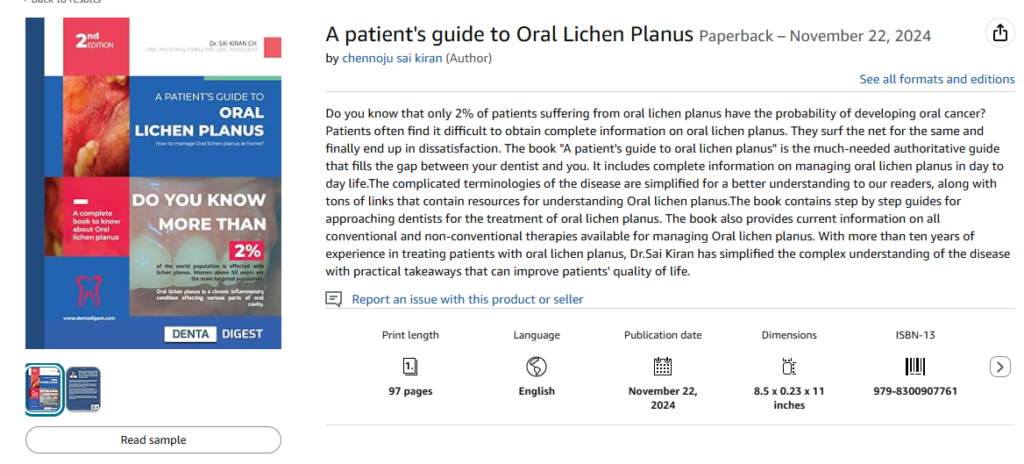Today, I want to delve into a crucial question that many individuals living with oral lichen planus often ask: “Which toothpaste should I avoid if I have oral lichen planus?” This is an important concern, and rightly so.
Oral lichen planus is a chronic condition that affects the tissues inside the mouth, causing discomfort, sores, and irritation.
As a result, managing your oral care becomes even more critical. While finding the right toothpaste that caters to your specific needs is essential for maintaining good oral hygiene, it is just as important to be aware of the types of toothpaste that could potentially aggravate your condition.
For those unfamiliar, oral lichen planus can lead to painful symptoms, and using the wrong oral care products can trigger flare-ups or worsen the discomfort.
So, today, we will not only explore which ingredients to avoid, but also discuss how certain toothpaste formulations may contribute to inflammation or further irritation.
Take the first step to a better Oral health!
Get tips on Oral health and discover ways to improve your Dental health. Sign up today
Your oral health matters, and by understanding the potential triggers in your toothpaste, you can make more informed choices for a healthier, more comfortable mouth. Let’s dive into how to protect yourself and your oral well-being when it comes to choosing the right toothpaste.
Oral lichen planus is a chronic condition that leads to inflammation within the mouth, often making the delicate tissues inside your mouth tender, inflamed, and highly sensitive. For those who live with this condition, even the smallest change in your daily oral care routine can result in an increase in discomfort, including painful burning sensations, irritation, or the development of sores. This heightened sensitivity makes oral care even more crucial, as using the wrong products can easily exacerbate the symptoms.
Choosing the right toothpaste becomes not just a matter of preference, but a key factor in managing oral lichen planus and maintaining comfort.
The wrong toothpaste can trigger a series of painful reactions, turning something as simple as brushing your teeth into an uncomfortable ordeal.
For individuals with this condition, it’s essential to be mindful of the ingredients in your toothpaste, as certain chemicals or abrasive elements can worsen inflammation, cause further irritation, and make it more difficult to heal.
With that in mind, it’s important to take extra care when selecting your toothpaste, ensuring it provides gentle, soothing properties rather than contributing to the discomfort. Understanding the needs of your mouth and choosing wisely can help you stay ahead in managing the condition and maintaining your oral health with confidence.
Gel pastes
First and foremost, it’s crucial to steer clear of gel toothpastes if you’re living with oral lichen planus. While they may seem like a popular choice due to their sleek appearance and fresh scent, gel-based toothpastes often contain higher levels of acidity compared to their traditional paste counterparts.
This increased acidity can be particularly problematic for individuals with oral lichen planus, as it has the potential to irritate the already sensitive tissues inside your mouth.
To understand why this matters, we need to consider the pH level of the toothpaste you’re using. The ideal pH for a toothpaste is typically between 6 and 8, which is neutral or slightly alkaline, making it gentle on your oral tissues.
However, many gel toothpastes fall outside this range, tending to be more acidic. When the pH of a toothpaste is too low, it can trigger a burning sensation or heightened irritation, intensifying the discomfort often felt by those managing oral lichen planus.
This irritation can hinder the healing process and make everyday activities, like brushing your teeth, an uncomfortable experience.
In short, while gel toothpastes may offer appealing flavors or textures, they may not be the best choice for those with oral lichen planus. Instead, it’s advisable to opt for a paste that is pH-balanced and free from harsh ingredients that could further aggravate your condition.
By making this small adjustment in your oral care routine, you can significantly reduce irritation and better protect your mouth from unnecessary discomfort.
Whitening toothpaste
Another type of toothpaste you should avoid if you have oral lichen planus is whitening toothpaste. While they may seem like an appealing option for those looking to brighten their smile, whitening toothpastes often contain ingredients like hydrogen peroxide and abrasives that can be particularly harsh on the sensitive tissues in your mouth.
Hydrogen peroxide, while effective at whitening teeth, can create an acidic environment in the mouth. This acidity can disrupt the natural pH balance of your oral tissues, leading to increased irritation, discomfort, and even a burning sensation, which can make the symptoms of oral lichen planus significantly worse.
On top of that, the abrasives found in many whitening formulas, such as silica or baking soda, can cause micro-irritations on the surface of your oral tissues. These tiny abrasions may not be immediately noticeable, but over time they can exacerbate inflammation, slow down healing, and contribute to further pain and discomfort.
While the goal of whitening toothpaste is to remove surface stains and brighten your smile, for those with oral lichen planus, the potential damage far outweighs the benefits.
Instead, it’s advisable to choose a toothpaste that is specifically formulated for sensitive mouths, without harsh whitening agents or abrasive components. By opting for gentler, more soothing products, you can avoid the extra irritation and better manage your condition.
Toothpaste containing clove
Another ingredient to be cautious of is clove, which is commonly found in certain toothpastes due to its natural soothing properties. While clove has long been praised for its ability to provide relief from dental pain and promote oral health, it can cause irritation for some individuals, particularly those with sensitivities or allergies to it.
For people with oral lichen planus, the delicate tissues in your mouth are already prone to irritation, so introducing clove into your oral care routine may do more harm than good.
Although it may initially seem beneficial due to its warming sensation and reputed numbing effect, clove can, in fact, trigger an allergic reaction in some people, leading to symptoms such as redness, itching, or a burning feeling on your gums.
These reactions can further aggravate the already painful symptoms of oral lichen planus, making the condition more difficult to manage.
If you notice any signs of discomfort, like increased redness, swelling, or itching after using a toothpaste containing clove, it’s best to discontinue use immediately.
As tempting as it may be to rely on clove’s natural healing properties, it’s essential to prioritize your comfort and avoid products that may inadvertently worsen the sensitivity and inflammation associated with oral lichen planus.
Opt for a toothpaste that is gentle, fragrance-free, and specifically formulated for those with sensitive or compromised oral tissues to ensure that your oral health routine supports healing rather than hindering it.
Toothpowder
Lastly, while toothpowders might seem like a nostalgic or natural alternative to traditional toothpaste, they should be avoided by those dealing with oral lichen planus.
Though they may appear to be a simple, time-honored solution for cleaning your teeth, toothpowders often contain coarse, gritty particles designed to scrub away plaque and surface stains.
However, these abrasive particles can cause excessive friction in the mouth, leading to micro-abrasions on the delicate tissues inside your cheeks, gums, and tongue.
For individuals with oral lichen planus, these tiny abrasions can have a significant impact. The already sensitive tissues in the mouth become further irritated by the rough texture of toothpowders, exacerbating inflammation and causing additional discomfort.
These micro-tears, while not always visible, can disrupt the healing process and lead to increased pain or burning sensations.
While natural products often sound appealing, it’s essential to recognize that not all “natural” options are gentle or safe for everyone.
Toothpowders may be effective for cleaning teeth in some cases, but for those with oral lichen planus, they pose unnecessary risks. Instead, opting for a smoother, less abrasive toothpaste that is specifically formulated for sensitive mouths will help maintain both the health of your teeth and the comfort of your oral tissues, reducing the chance of further irritation and ensuring a more soothing experience.
What to read more about lichen planus. Get the best-seller book on oral lichen planus today.

Which toothpaste is best for oral lichen planus?

So, what toothpaste should you use to manage oral lichen planus effectively? The best choice is a toothpaste with minimal ingredients, ideally a simple, white toothpaste that has a neutral ph. This type of toothpaste is less likely to irritate the delicate tissues inside your mouth.
A neutral pH—typically between 6 and 8—helps maintain the natural balance in your mouth, preventing the acidity or abrasiveness that could exacerbate the symptoms of oral lichen planus.
When selecting a toothpaste, it’s essential to prioritize gentle formulations that avoid harsh chemicals, whitening agents, or abrasive components. The goal is to find a product that cleans effectively without causing additional discomfort or irritation.
Avoid toothpastes with strong flavors, dyes, or artificial additives, as these can sometimes trigger a negative reaction in sensitive mouths. Instead, opt for products labeled as “for sensitive teeth” or “for gum care,” as they are usually designed to be milder and more soothing.
If you ever find that a particular toothpaste seems to make your symptoms worse, such as causing increased irritation, burning, or swelling, it’s important to stop using it immediately. Every person with oral lichen planus may react differently to various products, and what works for one person may not work for another.
Don’t hesitate to try a different toothpaste until you find one that helps keep your mouth clean without triggering discomfort. Being proactive and selective about the toothpaste you use can make a significant difference in managing your condition and maintaining your oral health.
How should I choose my best paste?
Remember, oral care is deeply personal, and what works for one person may not work for another. Every individual’s experience with oral lichen planus is unique, and finding the right toothpaste that suits your specific needs might take time.
It’s important to approach this process with patience and an open mind. With careful attention and a little trial and error, you can discover the toothpaste that best helps you manage your symptoms and keep your mouth feeling comfortable.
The key is to listen to your body, be gentle with your choices, and give yourself the grace to find what works for you.
With persistence and care, you’ll be better equipped to navigate the challenges of oral lichen planus and improve your overall oral health.
- Is oral hygiene compulsory for kids? - January 13, 2023
- How to Choose the Best Dental Crown for Your Smile? - December 8, 2022
- Who needs antibiotics before dental work? What is antibiotic prophylaxis? - October 31, 2022




Pingback: Oral Lichen Planus Cancer Symptoms | Dentadigest